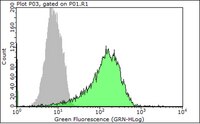Integrin-blocking antibodies delay keratinocyte re-epithelialization in a human three-dimensional wound healing model.
Egles, Christophe, et al.
PLoS ONE, 5: e10528 (2010)
2010
Show Abstract
The alpha6beta4 integrin plays a significant role in tumor growth, angiogenesis and metastasis through modulation of growth factor signaling, and is a potentially important therapeutic target. However, alpha6beta4-mediated cell-matrix adhesion is critical in normal keratinocyte attachment, signaling and anchorage to the basement membrane through its interaction with laminin-5, raising potential risks for targeted therapy. Bioengineered Human Skin Equivalent (HSE), which have been shown to mimic their normal and wounded counterparts, have been used here to investigate the consequences of targeting beta4 to establish toxic effects on normal tissue homeostasis and epithelial wound repair. We tested two antibodies directed to different beta4 epitopes, one adhesion-blocking (ASC-8) and one non-adhesion blocking (ASC-3), and determined that these antibodies were appropriately localized to the basal surface of keratinocytes at the basement membrane interface where beta4 is expressed. While normal tissue architecture was not altered, ASC-8 induced a sub-basal split at the basement membrane in non-wounded tissue. In addition, wound closure was significantly inhibited by ASC-8, but not by ASC-3, as the epithelial tongue only covered 40 percent of the wound area at 120 hours post-wounding. These results demonstrate beta4 adhesion-blocking antibodies may have adverse effects on normal tissue, whereas antibodies directed to other epitopes may provide safer alternatives for therapy. Taken together, we conclude that these three-dimensional tissue models provide a biologically relevant platform to identify toxic effects induced by candidate therapeutics, which will allow generation of findings that are more predictive of in vivo responses early in the drug development process. | 20502640
 |









